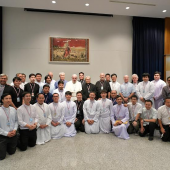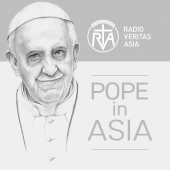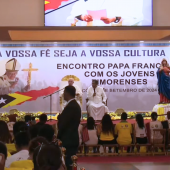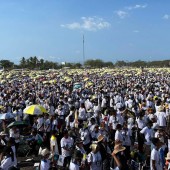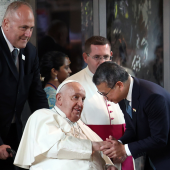Pope Francis, leader of an estimated 1.3 billion Catholics across the world, is visiting Asia this year, the fourth time since his election to the papacy in 2013.
The pontiff is traveling to Thailand and Japan, both majority Buddhist countries where Catholics represent only about 0.5 percent in each.
The visit to Japan is a fulfilment of the pope's childhood dream.
As a young Jesuit priest, Jorge Mario Bergoglio, who later chose Francis as his papal name in honor of the saint from Assisi, wanted to be a missionary to Japan but was refused because of poor health.
Pope Francis' visit to Japan, where he is expected to issue and appeal for peace, will mark the first papal trip to the country since Saint John Paul II visited in February 1981.
The pope's visit to Thailand, meanwhile, will coincide with the 350th anniversary celebration of the Vatican's mission to Siam, as the country was previously known.
Pope Francis has always had a particular interest in Asia, where Christianity is rapidly expanding.
In 2014, more than a year after he was elected pope, Francis attended the Sixth Asian Youth Day where he called for "peace and reconciliation on the Korean Peninsula."
In Korea, where he beatified 124 Korean martyrs, he called for the rejection of "inhumane economic models that create new forms of poverty and marginalize workers."
After only five months, in January 2015, the pope again traveled back to Asia to canonize Sri Lanka's first saint. There he proclaimed what he called as the "fundamental human right" of religious freedom.
In the Philippines days later, the pontiff spoke against "ideological colonization that tries to destroy the family" through practices as same-sex marriage and contraception.
In Manila, he spoke on caring for the environment and against "social structures that perpetuate poverty, ignorance, and corruption."
He warned against temptations of materialism, the promise of "ephemeral pleasures," and "superficial pastimes" that squander God-given gifts.
In 2017, Pope Francis visited Myanmar, the first time for a pontiff, where he stood to his reputation as a defender of the poor, the powerless, the refugees and migrants.
His visit came amidst a massive spasm of violence in western Myanmar’s Rakhine State against the Rohingya people, the largest and fastest growing refugees in the world.
In Bangladesh on the same week, the pontiff apologized to the refugees for the "indifference of the world" to their plight.
Pope Francis who was born on Dec. 17, 1936, is the first Jesuit pope, the first from the Americas, the first from the Southern Hemisphere, the first to visit the Arabian Peninsula, and the first pope from outside Europe since the Syrian Gregory III, who reigned in the 8th century.
Throughout his public life, the pontiff has been noted for his humility, his emphasis on God's mercy, concern for the poor, and commitment to interfaith dialogue.
While he does not support unbridled capitalism, Marxism, or Marxist versions of liberation theology, he is vocal against consumerism and overdevelopment.
Pope Francis maintains the traditional views of the Church on abortion, marriage, ordination of women, and clerical celibacy.
He calls for action on climate change with the promulgation of his encyclical Laudato si'.
Joe Torres




